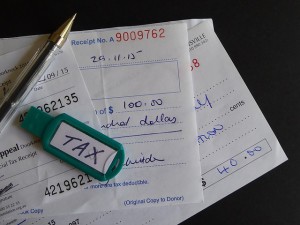What Is Sales Tax?
 “Sales Tax” is a tax that is charged on goods sold to end customers. The Sales Tax is a set percentage of the price of the goods sold. In the United States, all states except Alaska, Delaware, Montana, New Hampshire, and Oregon charge a sales tax, but the sales tax will vary widely by state. In Canada, there is also a Federal sales tax, so all goods are taxed twice (once by each province, and again for the Federal government). Many cities also impose a sales tax, so the actual amount of sales tax you need to pay will vary quite a bit if you travel.
“Sales Tax” is a tax that is charged on goods sold to end customers. The Sales Tax is a set percentage of the price of the goods sold. In the United States, all states except Alaska, Delaware, Montana, New Hampshire, and Oregon charge a sales tax, but the sales tax will vary widely by state. In Canada, there is also a Federal sales tax, so all goods are taxed twice (once by each province, and again for the Federal government). Many cities also impose a sales tax, so the actual amount of sales tax you need to pay will vary quite a bit if you travel.
Value Added Tax
Outside North America, particularly in Europe, it is more common to have a “Value Added Tax”, or VAT. The VAT is different from a sales tax because VAT taxes are charged at all levels of production, instead of just by the end consumer.
Who Pays Sales Taxes?
 Sales taxes are collected by businesses at the time they sell goods or services. Once sales tax has been collected, it needs to be accounted for separately from normal operating revenues, and “remitted” back to the government collecting the tax on a regular basis.
Sales taxes are collected by businesses at the time they sell goods or services. Once sales tax has been collected, it needs to be accounted for separately from normal operating revenues, and “remitted” back to the government collecting the tax on a regular basis.
Different levels of government (city, state, and national) have different rules for when sales taxes need to be remitted back to the government.
While you may notice that sales tax is almost always added to your receipt as a separate line item, businesses are not required to charge sales tax separately. In theory, they could simply pay the government out-of-pocket for the tax owed on the goods sold, but in practice it is generally easier to account for taxes if they are charged and accounted for separately.
Accounting for and paying sales taxes can be one of the most confusing parts of starting a retail business.
Sales Tax Vs Use Tax
In contrast to Sales Taxes, for which the seller is responsible for paying the government, a Use tax is a tax where the buyer is responsible for paying the tax.
Use taxes are generally applied for transactions where no sales tax was charged at the point of sale. For example, many state governments charge a Use Tax on large purchases made from another state that you did not pay a sales tax on with the original purchase (for example, if you purchase furniture online from another state and ship it to your house).
What Purchases Are Exempt From Sales Tax?
Even in states and cities with sales taxes, not every purchase is subject to a sales tax.
Groceries
Most states have certain tax exemptions for groceries, usually taxing groceries at a lower rate or no tax at all. While most groceries do get a break, “Junk Food” (with high fat and/or sugar content) and “Prepared Foods” (such as roasted chicken that is ready to eat) are still taxed at the full rate.
Out-Of-State
 Sales taxes only need to be paid for residents of that state, so if you are purchasing a good or service from a different state, you may be exempt from that state’s sales tax. You can also see this in if you travel internationally – there will often be “Duty Free” shops at the airport or border which do not charge sales tax if you demonstrate you will be crossing the border. In every day practice, you likely would be required to fill out a “sales tax return” with that state’s government, which only normally happens if you made a very large purchase with a high tax.
Sales taxes only need to be paid for residents of that state, so if you are purchasing a good or service from a different state, you may be exempt from that state’s sales tax. You can also see this in if you travel internationally – there will often be “Duty Free” shops at the airport or border which do not charge sales tax if you demonstrate you will be crossing the border. In every day practice, you likely would be required to fill out a “sales tax return” with that state’s government, which only normally happens if you made a very large purchase with a high tax.
If your purchase is sales tax exempt because you purchased it out of state, you will likely be required to pay a Use Tax for it in your home state.
Non-Profit
Goods and services sold to not-for-profit organizations are generally sales tax-exempt. For these organizations to get out of paying the sales tax, they are required to be registered as a Not for Profit organization, and request an Exemption Certificate from whichever government would normally be collecting that tax.
Goods for Resale
If you purchase goods and intend to re-sell them, you are also tax-exempt on that purchase. This comes into play most often with small businesses buying merchandise from wholesalers. Like Not for Profits, resellers are also required to obtain an Exception Certificate for their purchases.
Sales Tax Holidays
Some states have “Sales tax holidays”, where sales taxes are suspended either entirely, or for certain classes of goods. For example, Texas has a sales tax holiday in August each year for clothing, footwear, and school supplies that cost less than $100 to help families prepare students to get back to school.
Pop Quiz
It appears that this quiz is not set up correctly.
